




Here at Piebird Bed & Breakfast we offer life-changing workshops in self sufficency: canning, organic gardening, vegetarian & healthy eating, etc.
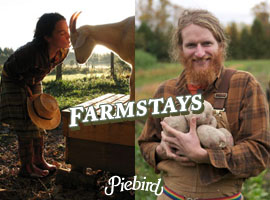
Come for a FarmStay at Piebird where you can come and help us lure dinner from the garden!
Piebird is the home of Soggy Creek Seed Co and is a vegetarian B&B in Nipissing Ontario. Piebird is a Happy Place!
Here at Soggy Creek Seed Co., we know that you are darn well aware that every mouthful of food you grow yourself takes a truckload of strain off the global food supply. So we’re putting together an illustrated booklet to document all of the knowledge that might help you. Everything you need to know and nothing you don't! If you have a keenness for obscure fields of knowledge, like alternative organic gardening (with a bit of quantum physics thrown in to balance out the folklore), then this will keep you happy, healthy and wise. Trust nature and keep a loose imagination.
Shouldn’t gardeners get together and speak about gardening as often as plants get together and discuss horticulture? Write us ( ) a letter and let us know your thoughts on gardening.
Also see our blog/article(s) HOW TO GROW THE FOOD YOU EAT.
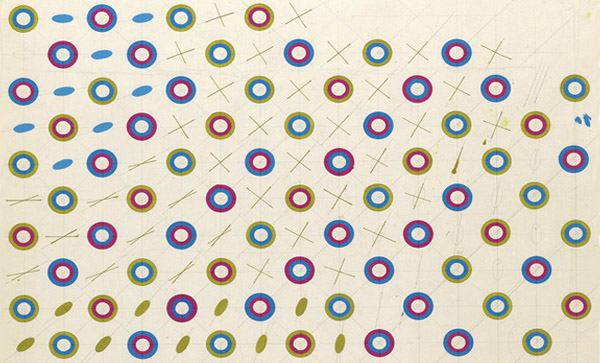
Soil is the most important crop you can grow. So you should love it like a lost sailor does -- drifting out at sea with a longing for the land and an itching of dirt under nail.
There are many minstrels traveling around singing carols of the sun. The sun may be the great organ of the sky, but the soil is the great organ below. It is the belly and the digestive system of the earth -- it is the skin ‘n bowels, it’s the soul and boots of the earth. Those ballideering minstrels should stay home by their quiet hearths and use the land for some other use than traveling -- use the land to grow food.
Soil is the mirror of your ideals. What you use the land for shows how you view the world. Before we discuss what soil is, look at what you’ve put upon it -- a sprawling bungalow? Some boundary? Spilt blood? Is it going to be giant footprints or happy plants?
We’d like to teach you to be a soil mechanic, a soil magician! (Come and sign up for a gardening workshops at Piebird B&B!)
In these quiet seed packets you can hear the future stirring.
The past has a tremendous influence over the future. Remember this when it comes time to choose which plants to let seed for next year's crop. Plants are not forgetful of their origins, their traits show memories of their mothers (so of course choose the strongest when saving seed). The need of every seed is to preserve the traits of its parents, and pass along the past.
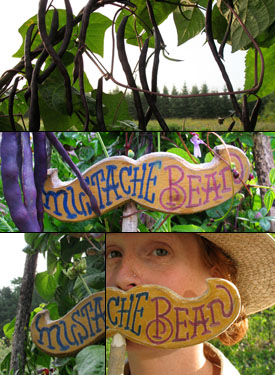 As you garden, one thing you'll learn is to observe the macrocosms for insight about the microcosms, and vica versa. Compare the cosmos to the most common -- or the compost pile to the piling leaves of autumn -- or the caterpillar's cocoon to the cold cold ground of winter. Just as the seed is the plant’s way to preserve itself (through time or winter) until the conditions for life are perfect again, preserving the open-pollenated seed is the gardener's way of feeding the future.
As you garden, one thing you'll learn is to observe the macrocosms for insight about the microcosms, and vica versa. Compare the cosmos to the most common -- or the compost pile to the piling leaves of autumn -- or the caterpillar's cocoon to the cold cold ground of winter. Just as the seed is the plant’s way to preserve itself (through time or winter) until the conditions for life are perfect again, preserving the open-pollenated seed is the gardener's way of feeding the future.
Our ancestors were very rich and eminent people, and with heirloom seeds they left us an enormous inheritance which we have almost forgotten.
Where we are now is mostly because of where we came from. Once we were all nomads on unnamed lands. Before settling into sedentary agriculture, we humans would travel and collect and carry and squirrel seeds around. We fit into nature as part of the seed dispersal process.
But growing your own food and saving your own seed have faded out of current reliance. As the older practices are fast disappearing, decaying in their different ways, we're also stepping out of the cycles of nature.
Now humans have claimed and oversee most of the good arable land on earth. Agricultural lands make up a precious and finite resource, and we haven't been too swell as self-appointed stewards. Like how the leaves of the sunflower seem to gobble up the sunlight, we humans hungrily gobble up the land. But our hearts hunger for more than just conquering some land with a driveway. Thoreau and his hoe wanted to make the earth say "beans!" And those beans want to say "Seeds!" We, as individuals, for the most part, don't participate in the production of food, let alone the dispersal of seed. We, as humans, have the audacity to try to be clever enough to skirt around the obligation of being part of the cycles of nature. There is a strange striving to be not what one is.
We dominate the land but avoid her rules. We willingly govern ourselves by government law more than we obey the laws of nature. Many consider only their own nature, with its rights, its claims, its demands.
Folks of today are gradually turning away from natural things and their lives are becoming more abstract. You no longer have to experience nature if you don’t want to. Ring tones are different than bird songs. Civilization is derailing too rapidly for comfort, but too slow to be very exciting. But we can find traction in our traditions. We should not try to be clever, but instead trust nature and be a part of her cycles. Save seeds! Spread seeds! Spread joy!
Being part of nature means not doing better by them than they’ve done by you. We can’t just take. Once enough of us begin to understand and live by these principles, the boundaries that now separate people from Nature will begin to fade and the human world many once again begin to move in sync with the rest of the Universe.
 Whenever humans get involved with life and genetics, such as breeding dogs, cats or artificial flavours - we have a remarkable tendency to increase diversity not decrease it. Why then are all the store-bought vegetables and vegetable seeds approaching the same bland blandness? They are going to melt them all down into this one uni-vegetable that ships well, tastes bad and costs nothing.
Whenever humans get involved with life and genetics, such as breeding dogs, cats or artificial flavours - we have a remarkable tendency to increase diversity not decrease it. Why then are all the store-bought vegetables and vegetable seeds approaching the same bland blandness? They are going to melt them all down into this one uni-vegetable that ships well, tastes bad and costs nothing.
Many heirlooms would never ripen (let alone survive) if picked early and packed into a truck for a week. The seeds should be for shipping, not the veggies - don't be silly! This is the same smart logic that would have us simply exchanging the recipe and not shipping the cake across the continent.
Heirlooms are strong, they have existed in isolation from modern industrialized farms for so long -- withdrawn far from the squalor of the marketplace. This is an isolation due to their very strong sense of superiority-to and disdain-for hybrids. With heirlooms we see little seepage in from other varieties, they're not interested in assimilating other characteristics. Humans like to do this, they like to adopt other ideas. This is how we’ll save the seeds.
The whole planet is dominated by doomed systems that are rapidly loosing their power and authority. The various fields of civilization (science, medicine, economics, education, politics, art, agriculture, etc) are restless and fertile. The current ways no longer work. But there is a new spirit spawning, creative ideas and approaches are emerging everywhere.
If you eat food, then grow food. If you grown food, then save seed. Carry some seeds with you where ever you go. Give it away, spread it in cracks, hold seed in your hand. Be part of nature with everything you do, look at all aspects of life. What about the waste you create? Nature has no waste. The mountains of the things we throw away pile over the things we need.
"The creation of a thousand forests is in one acorn." - Ralph Waldo Emerson
We have a bridge over every river, this makes the crossings easy and not even noticeable. Forgetting about water is dangerous. What if we humans traded truth and integrity for fear and dollars -- and then glared at the sun and polluted the water? Things that matter most must never be at the mercy of things that matter least. We must not trade the tremendous for the trivial. Treat the water right.
More to come... Why not go down the road here and check on the Nipissing Gnome

Everything promised is delivered to you by the sun. In the morning, when the sun steps down over the far hills, it is celebrated -- a great daily visiting presence that both stimulates and takes energy, for in the evening when it climbs up that ridge to the west, it leaves behind a spent and exhausted world. “Fare thee well, let your life proceed by your own design,” it says... only to return the next morning... “Hey looky yonder, tell me what's that you see. Looks like the sun!” the plants say with glee. The four winds blow the sun home again. It bears its chest, and beauty is made to sing.
All life-forms exist thanks to the energy produced by our sun - which releases photons of free energy as it builds heavier elements in its core. The plants and microbes capture this energy and utilize it to animate all life.
Plants grow by virtue of the sun’s life-giving energy that pours into the earth. Their leaves turn light energy into chemical energy and story it in sugar...
Plants look green because chlorophyll molecules absorb the red and blue light, and reflect the green waves. It's the energy of the red-to-yellow and blue-to-violet parts of the spectrum that is used during the process of photosynthesis.
(Just past the red and violet parts of the visible spectrum are of course Infrared and Ultraviolet rays. The chlorophyll is absorbing everything but the 550 nm (green) rays.)
The first part of photosynthesis, the LIGHT REACTION converts light energy to chemical energy. This reaction must of course take place in the light. Chlorophyll and several other pigments such as beta-carotene are organized and catch the light streaming to the Earth and store it in a rigid form (the pattern of sugar). Wowzers!
The universe is continually changing and flowing. There are energy vibrations sent out from the sun. There are energy vibrations sent out from the center of the universe. There are energy vibrations sent out from your heart. When organized in stable patterns or cycles this movement takes the temporary form of atoms, cells, seeds, deer, civilizations, etc. Chlorophyll is so obviously effective at converting vibrations of waves into matter that our understanding can easily document this in diagram for elementary school science class.
Here’s where it gets interesting, Chlorophyll is almost exactly like the building block of your DNA. This only different is that yours have Fe at the center of the compound and the plant has Mg at the center of its chlorophyll. The molecule that captures the energy from waves of the sun and stores it as matter is identical to the basic building block of human life!
We’ll give you a minute to process that. We have to go slow with our monkey minds. You’ll surely start eating more green food now, more chlorophyll, just make sure it’s fresh. Why do green leaves change colour, often becoming a paler and yellowy when old or cooked -? When vegetation gets damaged Chlorophyll’s central Mg atom is replaced by hydrogen ions. This affects the energy levels within the molecule, causing its absorbance spectrum to alter and the perceived colour to change. Some of these more delicate colours (from molecules such as carotene & quercetin) are revealed when the chlorophyll molecule decays and the leaves turn red, orange, and golden brown. This is that same thing that happens in the woodlands of Autumn. And as long as we’re talking about the sun, we should discuss these seasons...
Wherever you live, if you are unfamiliar with your habitat's habits, get to know some people nearby who are at home on the earth. Ask them about things they have noticed about your little neck-of-the-woods. Hopefully they will have been keeping track of stuff like first frost in the fall and the last frost of spring. Keep track of these things yourself; as well as a diary of general garden behavior. It's important to keep record of as many cycles and patterns that you can notice. Pay good attention to your garden, the instincts and impulses of an artist, namely and mainly OBSERVATION, are the same skills required for good growing.
It's true, a gardener suffers the artistic impulse to do great deeds from some deep innate obligation to beauty. Gardening, like art, is pattern recognition in practice.
Observation is learned, so keep observing. With an observing eye, you'll probably begin to notice things such as the signs of disease emerging more around the damp full moon. With all your senses, pay attention to the nonsense too, it is as important as the sense. We humans have vastly greater capacities for experience than for understanding, so basorb it all. Gardening engages the entire person, not just the intellect. All of the synchronicities and things that just happen to happen in your garden are important. Each of the many invisible functions performed by an ecosystem, operating in all their complexity, are a central element to the ecosystem as a whole. Everything that happens, know that it is done with a greater regard for resilience. You should be able to see the reflection of nature's ways on all of your garden systems.
Gardening is based on speculation, on logic, on thought, on the synthesis of what we know and on the analysis and observation of what we do not know. All life is charged with significance -- every morning is a little different, and each new sun lets you to see a little more eye-to-eye. Observations will become obvious, and evident. When you’re half out of the habitual, you’re into clearness and clarity -- these things you learn are no longer fragments of knowledge, but of common sense.
Get to know your seasons and the stories of their own. Even with weather patterns changing you'll be able to learn and determine what to expect from spring, and what to watch-out for in fall. This is especially important for northern gardening where there is such a significant different between the things such as summer and the things such as winter. Winter is like a pirate who has a snowflake on its flag instead of a skull and cross bones. And summers can be short and rude. Winter's are full of taunt and summer's are full of invitation. Then there is the throbbing commotion of spring, making a million promises that it doesn’t always keep -- but we don’t mind, we’re so grateful after winter was gently gambling with our lives.
Get to know the similarity between the seasons, the PATTERNS they all follow. The white flowers of the pea plant are something like snowflakes falling. Compare the immediacy of spring with the lingering of winter.
Humans have this unconsciousness fascination and attraction to patterns. We feel the richness of beauty, music and geometry. We can even see patterns where none exist.
Patterns are the language of nature. Organization the echoes, harmonies and overtones, is what nature spends all of her time doing. When these patterns breakdown we observe disorganization, until elements are reorganized again into a new pattern or absorbed as part of another system. You can observe all of this in your garden.
The seasons are determined by the sun and earth. But there are also other patterns worth reflecting upon, other forces playing in your garden, forces that come from further away than the sun. The sun is 99% of all the mass in the solar system, but has only one percent of all the angular momentum (speed and size). All of that other speed & size is made up by the planets, mostly the outer gas giants whose whipping around can even exert a tidal effect upon the sun. These beasts move with enough momentum to pull the sun out of position as the exact center of our solar system. If they can wobble our sun then you'd be right in thinking that they have an effect on the plants here on earth.
Let's start with the planetary bodies that are the easiest to observe, this thing we stand on and our lovely moon of the night sky. The Earth is basically a dirt and water covered magnetic generator similar to the core of the sun. Our heart too is an electromagnetic instrument, producing magnetic waves. Our hearts and hope are what holds this whole thing together. The same function that your heart preforms for your body is what the earth does for the plants.
Our Earth is a jewel of the galaxy. Our sun is so proud of it. And here on Earth, we have that same pride for our moon. In the sky, it's easy to observe the moon. It goes across the sky at the same speed as the sun, taking the same path, but six months opposite. The point on the horizon where the summer solstice sun rises is the point where the winter solstice moon rises. Here in the north, the moon is low in the summer and the sun is high.
These are simple observations to get you started. Once you start observing, it will become more than concentration and perception -- inherently, observation becomes participation. Patterns become rhythms, and then rhythms let you step into them. Then our purposeful participation in these rhythms will benefit things like planting and harvesting. Perhaps the most familiar of these rhythms is the movement from New to Full Moon that we witness each month. Planting with the energies of the Full moon ensure good germination for things that need steady moisture -- the tide of ground water is drawn near the surface. But this same phenomena is a detriment when harvesting for winter storage. Also, the easy growth around the full moon can make plants weak and open to fungus and disease.
Any observer minding their own business will observe other things in the sky too. Planets that go across the sky slower than the sun, planets who were the towering gods of a prior time. Venus, with her jaws reaching from heaven to earth. Saturn wearing the rays of venus as a crown. Then there’s the constellation Buddy Holly. Keep your eye on the ripe heart of the Milky Way.
Now you’re observing! When you are obsessively making observations, you’re bound to run into contradiction, confusion and quarks. This is where your INTUITION comes in. A gardener is never idle enough to do much thinking, so must instead feel somehow that their instincts are right. This instinctive certainty is your intuition, it and your IMAGINATION will be sharpened by observing nature’s exotic nature. That’s good, because imagination and intuition are both handy tools for gardening...
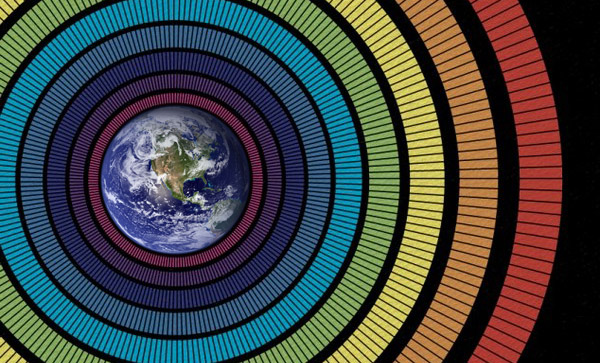
In all living nature (and perhaps also in that which we consider dead) love is the motivating force which drives life. We are able to easily understand how the energy of love can transform itself into song. We can hear this on the radio. The energy of love can also transform itself into poetry -- this is like plants transforming the energy of sun into a solid of sugar and storing it. We can transform the energy of love into art. Love can become a passionate compassion -- that connects you to all those things beyond the farm fence and has you care about them. We are able to understand how love becomes good instincts and ideals.
So we can possibly even imagine how the same energy of love may transform itself into other things as well. ...perhaps a higher order of intuition, and into a higher order of consciousness? Gardening, like alchemy, is not about making gold out of lead, or tomatoes out of dirt -- but about transforming yourself.
We are creatures of love. Love will reveal a marvelous and mysterious world, every romantic comedy will tell you that. But for good gardening we need more than just to love our plants. We need more than just the full moon. Beyond nutrients and microorganisms, the plants and the soil also need the influence of the will and spirit of the gardener. Apply your dynamics onto the biological world.
“Love is light ignited.” Love is some kind of electromagnetic energy. It’s on the spectrum somewhere between 110 volt electricity and consciousness. Like electromagnetic energy, and like consciousness, love pre-existed humans. Plants must have been subject to it long before we arrived.
As a gardener, your will and intent for the happiness and healthfulness of the plants will do them more good than clouds raining compost.
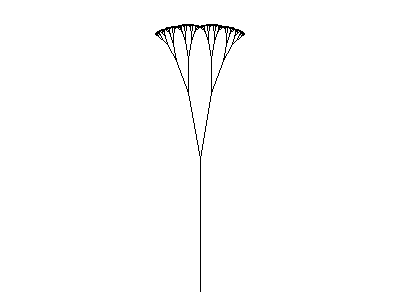 Get to know your plants too in the course of their gradual development, they will have their own personalities and particular oddities which are often profoundly unusual. Some will love to be gloomy and tragic and will try every little thing to get your attention. Flowers will often fane beauty just for effect. I've seen cabbage that treated me so cavalierly that wouldn't be uncouth if you made public accusations of imbecility against it! Sometimes gardening can be a challenge to life and sanity. But there is both truth and teachings in trouble.
Get to know your plants too in the course of their gradual development, they will have their own personalities and particular oddities which are often profoundly unusual. Some will love to be gloomy and tragic and will try every little thing to get your attention. Flowers will often fane beauty just for effect. I've seen cabbage that treated me so cavalierly that wouldn't be uncouth if you made public accusations of imbecility against it! Sometimes gardening can be a challenge to life and sanity. But there is both truth and teachings in trouble.
Should your spinach be a scarcely beast that is no longer wholly guided by instinct; and being only spinach, not yet wholly guided by reason -- should it bolt in the earliest days of spring, just relax and know that sometimes behavior seems to fall short of explanation. While heat is usually thought of as the main cause of bolting, day length actually initiates reproduction response in spinach. Flowering in common varieties is switched on by days about 14 hours long.
Maybe chronology just isn't your spinach’s strong point. Maybe they are like a baby that likes playing in a briefcase. Maybe they already thought they leafed out and it seems totally normal to flower in early May. Maybe then your lesson is to shake up your own schedule, do things you wouldn’t normally do and do them at a time you wouldn’t normally do them.
Some plants are just plain taught roughly by life -- while others are endowed with understanding or intuition, or both. As you are getting to know them and are seeing what they need, they are getting to know you.
The crassness and other drawbacks of of a uncooperative cucumber bush may actually be providing you with something you need more than pickles. If you garden as a rational, by only your own reason, then every plant should be rooted up and scolded.
Other plants will be well behaved in every way, "independent self-starters," their resumes will say. But with these plants you should be no more modest than you might be immodest if you had crass plants. Remember, gardening is not for your posterity (!!!).
Saying that some plants behave well and some plants behave poorly isn’t to say that there are hero’s and villains. There is no need to declare plants as either allies or rival foes. You don’t want to be the big bully between the cultivated and the weeds, yelling fight fight fight. Building up an enemy as existing is used as a way of mobilizing the people, if you can get them to believe it. But it doesn’t work so hot with plants, they aren’t as motivated by fear.
Imagine going to your neighbour on wash day and telling them that tree beside their house is a nuisance, it has to go, you’re going to rip it out the ground. That tree that they played around as a kid, that tree that their clothesline is tied to, let’s get rid of it right now. Your baby carrots will look at you weird if you tell them there is a problem to run away from.
A lucky threat to conventional understanding of weeds is when people find one that they enjoy eating. Suddenly their whole perspective changes. Dandelion greens first thing in the spring, roots roasted and ground for coffee. From the lawn, the red clover blossoms for tea. The Yarrow. From the forest, the Stinging Nettle. Learn how these weeds benefit your health, and learn how these weeds benefit your garden (come to Piebird for a workshops about SOME PLANTS YOU SHOULD GET TO KNOW).
Some plants are like the great pines that stand at a considerable distance from each other. Each grows alone, murmurs alone, thinks alone. They do not intrude upon each other. Many plants have wild imaginations. Tomatoes are day-dreamers, right now they are probably imagining themselves in coconut groves -- and cannot even comprehend the coming of winter. Carrots with large thighs have lower centers of gravity which makes them sink deep into the earth.
Some plants, work best in groups and seems to even enjoy the eerie enculturation that comes with it. Your garden will inherently become this cute little society. Maybe it will be a quaint small town, with it's own grocer, police force... The Potato Beetles will start a brothel. You'll probably even notice the quiet arrangement of government. What you need to do in this case is convince those plants to vote you in as mayor, you can clean up the town a little bit, make some good changes, improve some infrastructure, but mostly just let it work itself out. Or you can integrate yourself into the micro regional economy, you're probably after food from the garden, but can surely bring the benefits of water and security.
The idea here is to find a well defined roll in a stable culture. Find a role in the garden that suits your gardening style. You can be the mayor, ringleader or a service provider -- like a plumber, just making sure everyone gets water and drainage.
Many farmers are like captains of industry that run factories -- but beware, with too much efficiency, compromises are made. If you want to be ship’s captain, avoid mutiny and feed them well to prevent your plants from getting scurvy. Fill your hull with compost. If you’re going to colonize, then give them railroads at least and try not to destroy their culture.
Whatever game that you play, we recommend that you avoid the temptation to treat your garden like some cult you've started. Even if your plants follow you wherever you go, please don’t be some failed mystic. Foster and guide their spiritual growth yes, but you need not preach or baptize.
We have a spiritual essence alongside our physical beings. Most would agree with me here. But we are not profoundly special in this regard. Plants too have a spiritual essence. And like yours or my spirit, there is a seeking for guidance and growth. We can help foster a guide this spirit in the plants, but that is not to say they need to follow some outside authority (us) rather than their own inner reasons.
Plants generally are not in the market for a new world-view. They have an acceptance for the way things are, they are content to believe in something so far away and not getting closer. This is the strange challenge of missionaries, to convince a happy and satisfied group that they are lost and in need of help. You can talk to your plants about the contents of your mind, but they are not your congregation. Organize, not supervise. “The greatest among you shall be the servant.”
Now you’re probably out on your knees trying to see the spirits of your plants. If you consider metaphysics as an extension of the physical, then you might try to actually see the plant’s spirit -- as if it was some smokey soul wafting up to the moon. But spirit, being elegance itself, cannot hope to achieve visibility. So you’ll have to see it in other ways. Try to observe this manifestation of incomprehensible chemistry which we call life and personality and spirit and energy.
Hopefully you're not looking in this section because you are seeking advice in the face of awful trouble.
I’ve always thought that the best stories in literature are the ones where the protagonist and the antagonist aren’t obvious and the reader is left to form their own opinions. Same with the garden, I’m not going to spoil it and tell you which bugs are good and which bugs are bad, you should observe and form your own opinion after numerous deductions and conclusions.
Put away your bug book, put away the analytical state of mind, end any compulsion to identify, and just sit and observe. The sense of distraction and the sense of preoccupation are not actually real senses.
In nature there is no such thing as absolute good and evil, winners or losers, or us and them. Individual creatures do no exist separate from the natural world or one another. They are always intimately connected to their surrounding social and physical environments. So don’t be overcome by the irresistible inclination to destroy the existence of other breathing creatures. This is among the strangest of convictions formed by us humans, we engender ourselves with all kinds of weird ideas. If you wage yourself against bugs, you will be with fitting scars from its war. Unnatural insecticides on insects make their stomachs wheezes and their lungs empty. Instead, be moved by the magic of the uncanny lives of creatures different from yourself.
Disease and pests are the signs of imbalance. Whether it's bugs or deer or drought or disease, the pests you see are misunderstood symptoms of its real illness. Luckily, most of the problems of pets can be solved by natural predators and hand picking -- by restoring balance.
If you find another tired plant forsaken in the delirium of illness, or with pests prowling all around it, or a steady flow of furry nighttime snackers, then look for the deeper root of all its suffering.
Usually the distress of the gardener is far worse than the stress upon the plant. That is why we offer humor to whom will adopt it. I just laugh at those caterpillars who eat so much of my cabbage, you can laugh too knowing that they’ll grow into an obese butterfly -- how funny is that, a beautiful butterfly who is too fat to fly!
As a general rule, if you create an atmosphere which destroys the pest's customary expectations, you will also be creating an atmosphere where miracles can flourish. Many pests, such as Japanese beetles and carrot rust fly find their food by scent. Their vision has developed into a weird technicolour kaleidoscope. The brightly coloured swirling octagons don't coherently represent the physical world they live in -- at least not for the practice of finding food. So these pests use the mechanics of smell to find the food in your garden.
Masking the smell with onions, chives and aromatic herbs does more than make them confused, the bug who is normally so confidant in their ability, becomes uncertain and insecure. Merely masking the smell of their food to make them hungry is not enough, you must shake the self-confidence if you want them to avoid your patch. Feel the satisfaction from leading others astray!
Others plants have a near complete absorption in such eccentric interests as keeping aphids as pets. I never even considered that a plant may want a few pets. If you give them enough care and love it's only natural that your plants will be inspired and want to adopt a few needy pets. The relationship between plants and aphids is like the relationship between children and puppies. Now don't let them have too many puppies. A mom wouldn't get her child one hundred puppies, so don't let your plant have one hundred pet aphids. Do as any parent would do if they heard the rustle of ten billion hamsters in their kid's bedroom, hire a piper and send them all away!
For some specific and practical pest information, why not take one of our workshops!
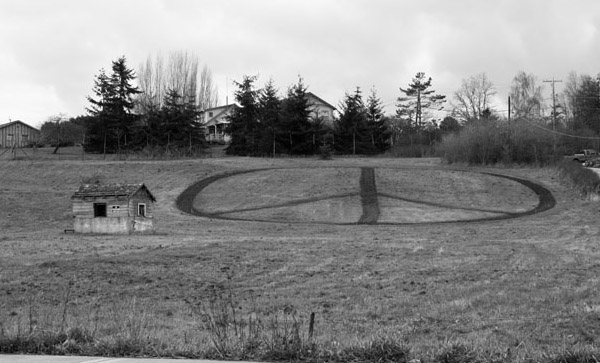
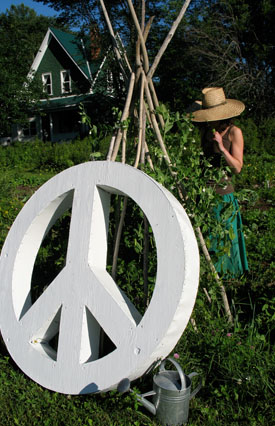 You can feel it out in the fields, the kind of growth we do in a garden is greater than any other growth. In a garden, the sun still shines, you notice things about life that would be hard to observe in a shadow on an office wall. With a little help from your garden you are bound to have insights that are way to big to bound: your soul feels beautiful, and beauty feels like the only truth, and beauty becomes everything believed in. This is peace.
You can feel it out in the fields, the kind of growth we do in a garden is greater than any other growth. In a garden, the sun still shines, you notice things about life that would be hard to observe in a shadow on an office wall. With a little help from your garden you are bound to have insights that are way to big to bound: your soul feels beautiful, and beauty feels like the only truth, and beauty becomes everything believed in. This is peace.
Gardens are drafting peacemakers. Everyone should have a hoe! In a garden, you learn the ways of co-operation, consideration, courage and compassion. The whole idea of compassion is based on a keen awareness. First you have to see that other being and then realize that you are all one. Then you’ll notice all living things and become aware of the interdependence. I don’t know when else in my life I have ever had such an awareness of Beauty and sense of spiritual validity than in the garden.
I don't mean to be yammering away, talking about gardening as if I'm describing a dream. All I mean to muster and say is that gardening teaches a different way of being in the world. We all feel a bit helpless that our lives are so deeply woven with a dependance on distant others to feed us. Growing ones own food can satisfy a person who is looking for a simple truth to live by. Why not share that experience with others who have not yet chosen to grow? After, they'll be wondering why nobody ever told them about it before!
Doing more for ourselves, like growing our own food and saving our own seed is doable and pleasurable and powerful. People are deeply disconnected from where food comes from and even confused as to what food is. Look at your lawn, sell your lawnmower and buy a fork! Happiness is in the practices preserved in the lifestyles of simple live folk.
With that good feeling gardening gives us, it's almost as if our salvation depends on it. Maybe our humility and spirit cannot be enhanced by television or traffic? Maybe our humanity depends on us helping plants?
Now, your task is to carry that good feeling that gardening gives with you when you leave your garden. Give some seeds to your friends and neighbours. Connect and co-inspire each other, transform ourselves and change the world in the process. Liberation leads to liberation.
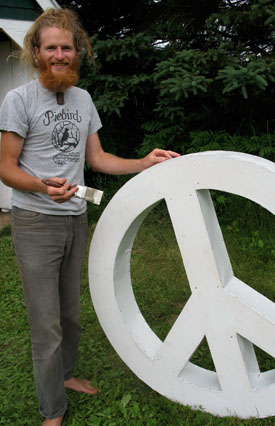 Here at Soggy Creek Seed Co., with these seeds we wish to create something new, not new plants, but new attitudes. We're not trying to echo some weird green eco-economic model. We want to demystify organic gardening and show how easy and important it is. Gardening is not some horrendous struggle. Everyone should explore and enjoy the increased richness of the experience.
Here at Soggy Creek Seed Co., with these seeds we wish to create something new, not new plants, but new attitudes. We're not trying to echo some weird green eco-economic model. We want to demystify organic gardening and show how easy and important it is. Gardening is not some horrendous struggle. Everyone should explore and enjoy the increased richness of the experience.
We live in a wild time, we're all wondering what we can do to make a difference. If it bewilders you that the majority still fill their garden plots with store bought annuals, instead of open-pollenated vegetables grown from seed, then grow some plants, save the seeds, share them and spread the joy!
The absolute best thing you can do to minimize problems caused by poor soil texture or structure or porosity is to add organic materials. Compost compost compost! Return the nutrients!
If you're not one to be haunted by the fear of becoming extravagant, you even might want to come take one of our workshops and become a composting queen!